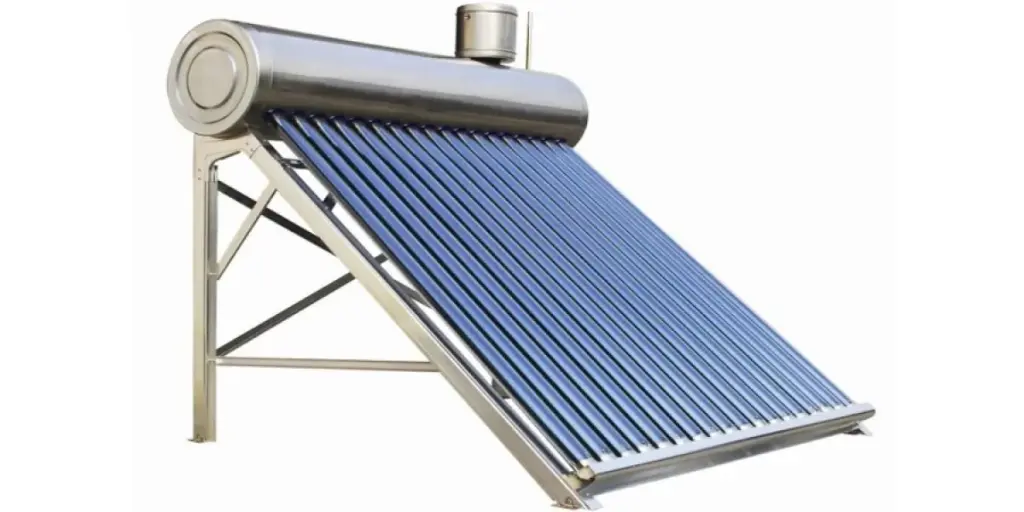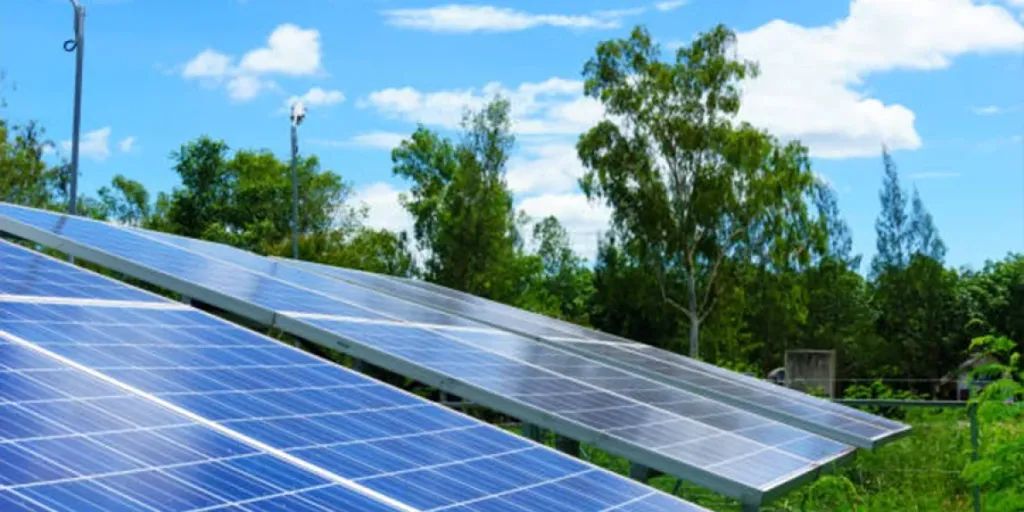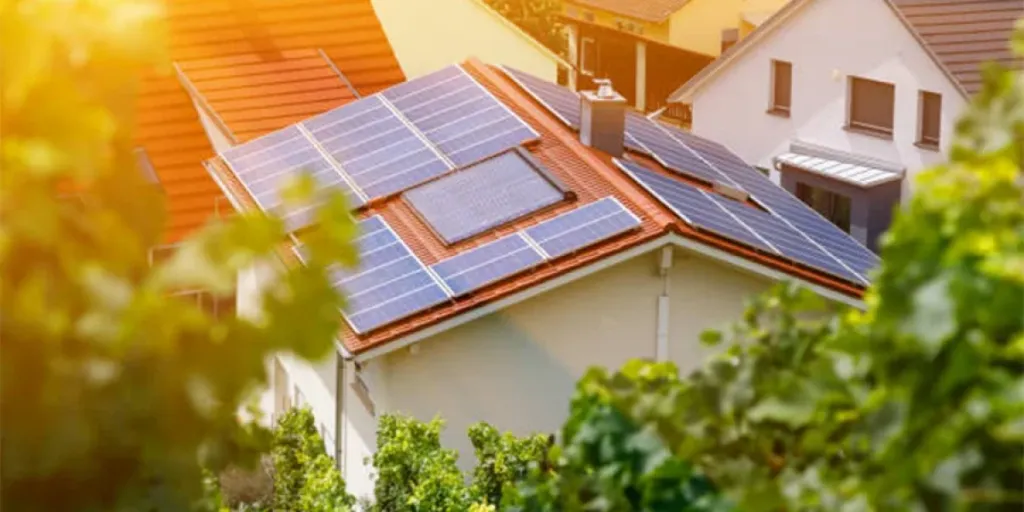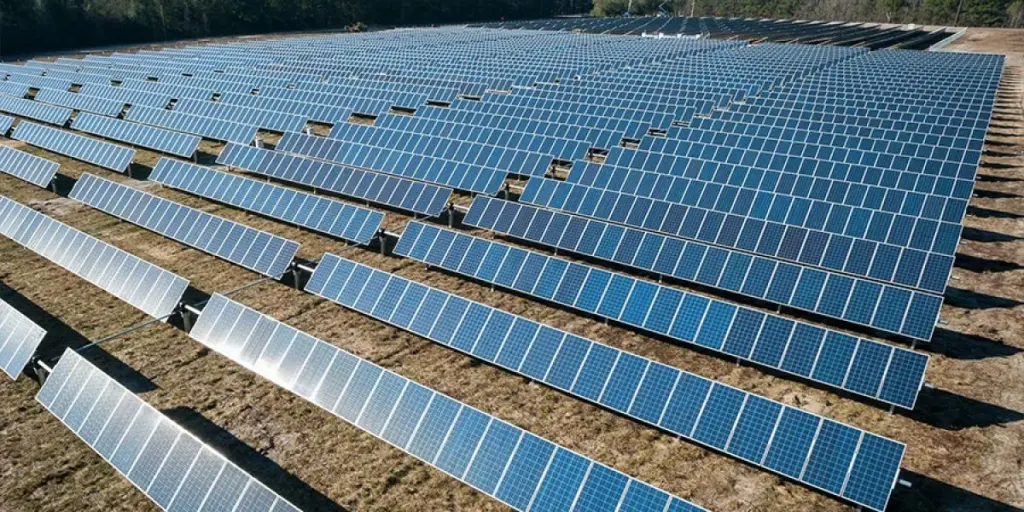Solar panel water heaters are an excellent way of heating your homes, with their environmentally friendly and cost-effective nature. The demand for these products is increasing steadily. However, with different options available in the market, it can be a challenge to find the right models to suit customer preferences.
This article will offer key insights into the different types of solar panel heaters and important tips to consider when purchasing the right solar panel water heaters for your business. Additionally, it will discuss the market share of solar water heaters. So read on to ensure you can confidently select the right solar water heaters.
Table of Contents
Solar water heater market share
Types of solar panel water heaters
How to buy solar panel water heaters
Conclusion
Solar water heater market share
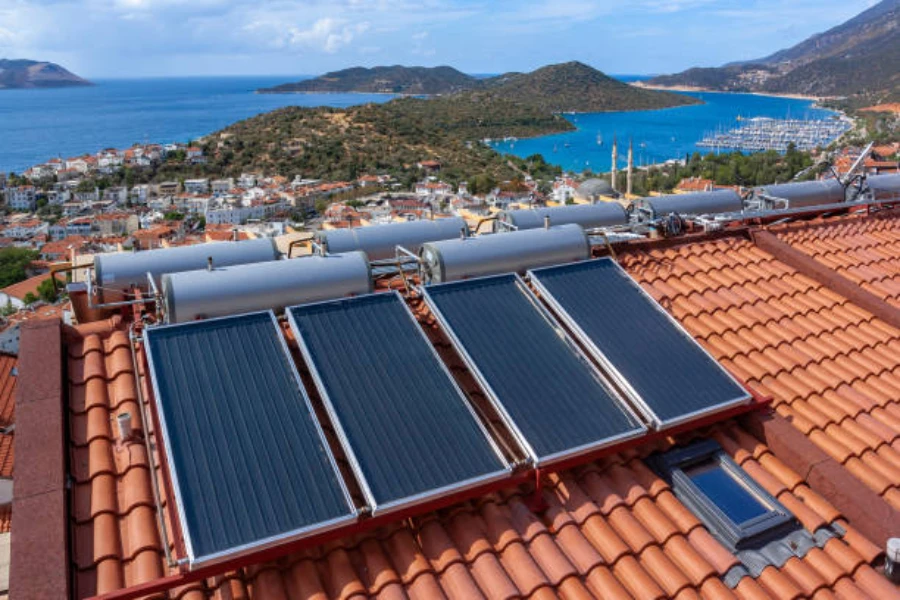
Global industrialization has a major impact on the environment as they produce emitants such as carbon dioxide (C02), which causes climate change. However, the world is changing towards more renewable energy sources, including solar water heaters. In this case, the demand for solar water heaters has grown positively. One of the major contributors to market growth is the production of environmentally friendly solar panel water heaters. Also, reliable and affordable solar heating water products increase demand.
According to Precedence Research, the growth of the solar water heater market share is anticipated to reach an estimated value of USD 6.51 billion in 2022 and also a projection of USD 14.3 billion by 2030. The market was predicted to have a compound annual growth rate of 10.43% from 2022 to 2030.
Regarding regional insight, the Asia Pacific leads among Europe, North America, Latin America, and other regions. The increased demand in the Asia Pacific is geared by rapid industrialization and commercialization.
Types of solar panel water heaters
1. Flat plate solar water heater
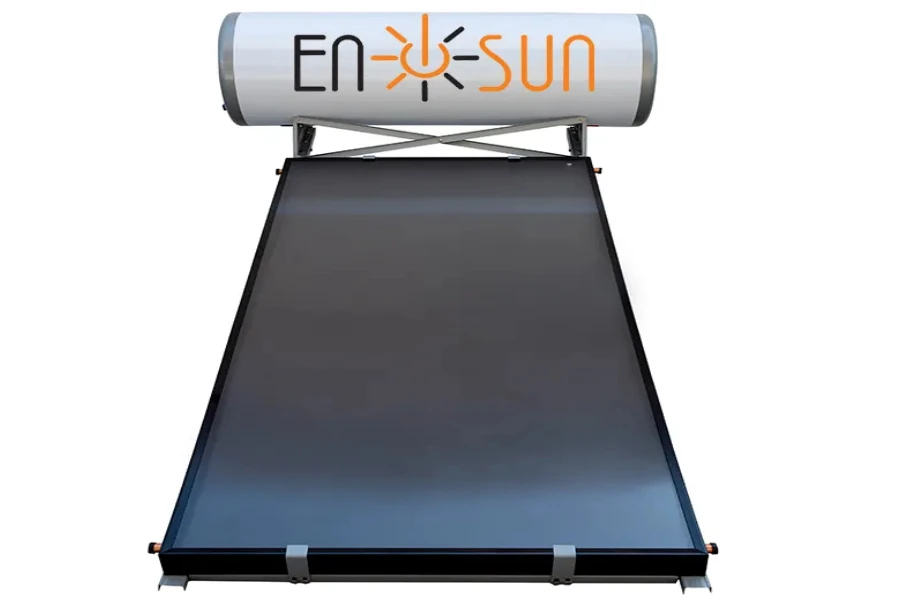
A flat plate solar water heater collector converts heat from the sun into heat energy. It consists of a large heat-absorbing plate with copper pipes containing the heated water purposefully for transferring heat. Flat plate solar water heaters are made from aluminum and copper because they are good conductors of heat. They also contain a protective glass or insulated metal on the top. Flat plate solar heaters are typically cheaper because of their simple design and are easy to install.
2. Evacuated tube solar water heater
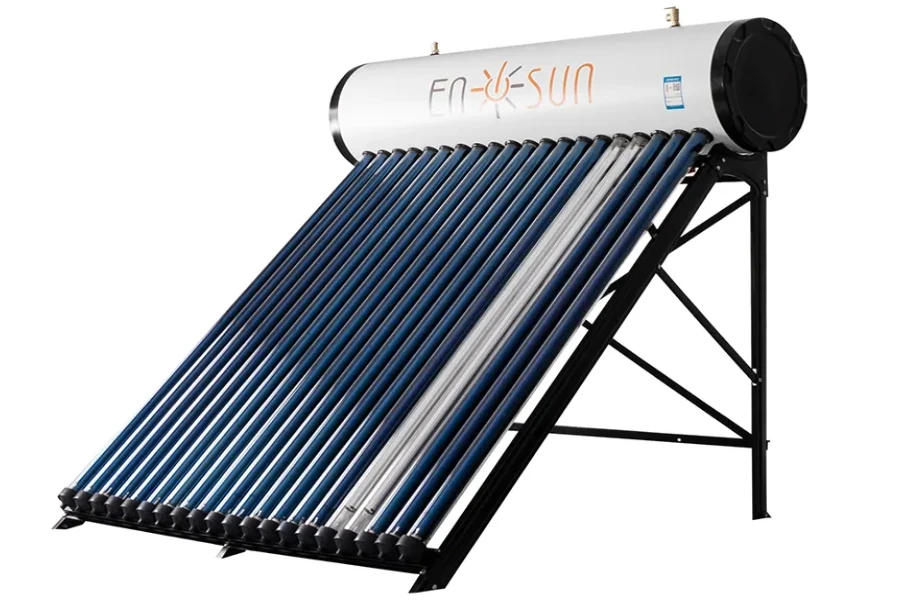
Evacuated tube solar water heaters use a series of vacuum-sealed glass tubes that contain heat-absorbing fluid. The tubes are normally around 25 to 30 and are designed with a flush setting frame. Evacuated tube water heaters can be replaced in case of any damage during installation or after. It consists of two glass tubes, a smaller one within the larger one.
However, the inner layer of these glass tubes is coated with aluminum nitrate or titanium nitride oxide, which helps to increase the absorption rate of solar radiation. The heat is then transferred through the heat transfer fluid to the house via the heat exchanger. However, this type of water is deemed expensive, but its output in heat energy conversion is high.
3. Integral collector storage solar water heater
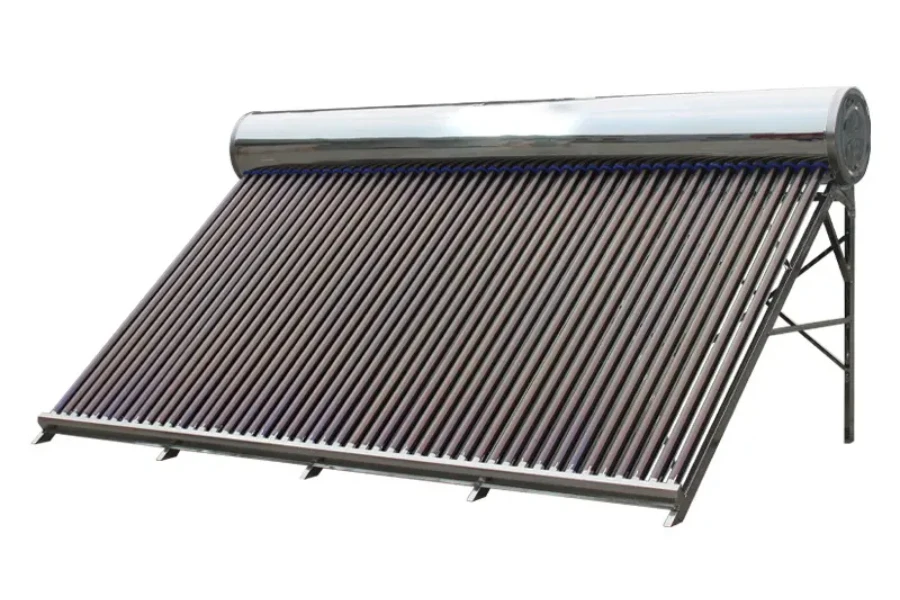
An integral collector storage solar water heater is widely used for homes because it is affordable and easy to operate. This type of water heater is assembled into one unit; other necessities like pumps and electronic controls are not needed. Integral collector storage consists of a solar collector and a black storage tank to absorb solar radiation. The collector is made of several copper pipes that go through a secure and insulated box painted black inside to enhance maximum heat absorption.
Integral collector storage solar water heaters perform well in sunny and warm climates and can provide up to 80% hot water. This type of water heater is ideal for homes with low to average hot water needs and small space for installation as they require minimal work. However, Integral collector storage can be efficient in areas that experience cold weather where the temperatures are low.
4. Thermosiphon solar water heater
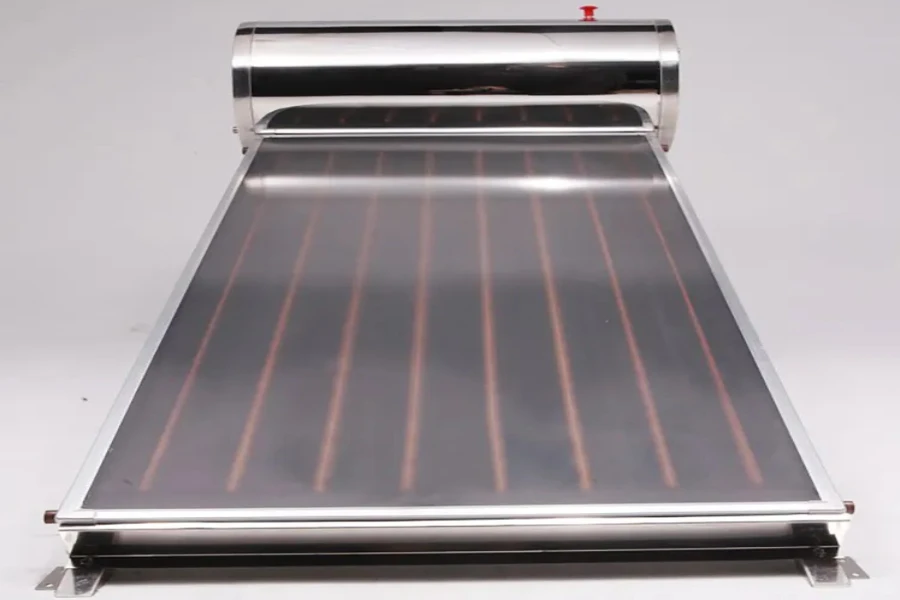
A thermosiphon solar water heater is a type of water heater that operates on the principle of thermosiphon, where colder water sinks because of high density while the hot water rises. The system is made of a solar collector mounted on the roof’s top and water storage below the collector. The solar collector absorbs heat radiation from the sun and heats the water inside the collector.
The Thermosiphon tank is insulated to avoid heat loss during low sunlight required to heat water to the required temperatures. Additionally, thermosiphons come with sensors installed inside the tank to prevent overheating and control backup heating components. Thermosiphons are easy to install and have favorable prices, making them best for residential and small commercial applications.
5. Heat pump solar water heater
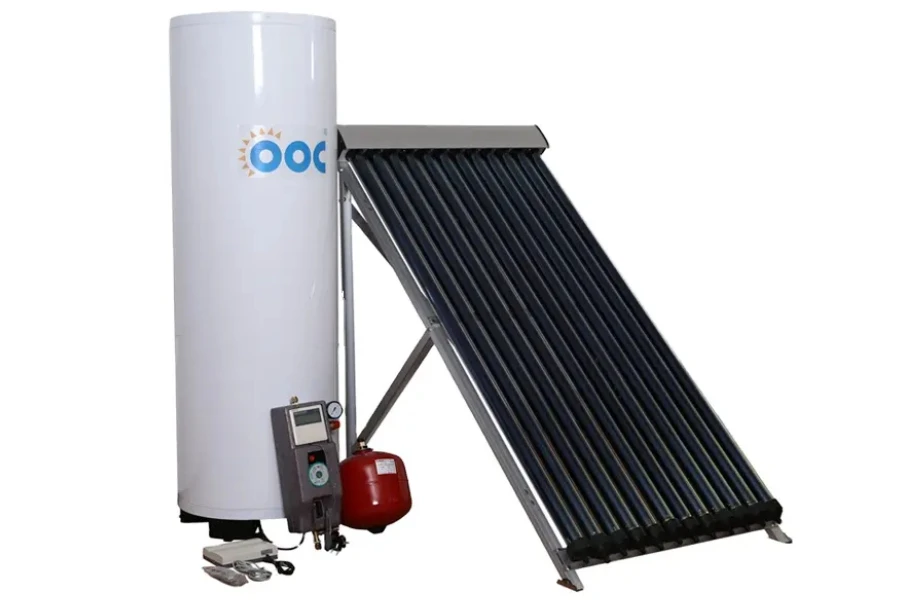
Heat pump solar water heaters are a high-performing system that incorporates the technology of heat pump and solar water heater. This highly energy-efficient system uses a hot temperature to heat the water. A heat pump solar water heater includes an evaporator, condenser, compressor, and expansion valve. Heat pump solar water heaters rely mostly on heat in the air to function properly.
This system is highly effective in households with high demand for hot water throughout the year and is situated around places of mild to warm climates. However, the installation process can be harder than other solar water heaters, and regular maintenance is needed to increase its durability.
How to buy solar panel water heaters
1. Size
When choosing the right solar panel water heater, it is crucial to consider the size. The size of the solar panel water heater should be proportionally compatible with the amount of hot water needed on a daily basis. When determining the size, the number of households, the amount of water needed, and the climate should be considered. Investors should also know that size impacts the prices of solar water heaters; the larger the size, the higher the price, and vice versa.
2. Cost
Cost is among the key factors that buyers should look into when acquiring solar panel water heaters. The cost of solar panel water heaters varies depending on size, capacity, type, and efficiency. It is crucial to consider the lifetime cost of the solar water heater, including installation, maintenance, and repair costs. It is always advisable to go for those solar heaters that are within your budget limits and fit your business’s preferences.
High-quality solar panel water heaters cost more than other solar panel heaters. Simply because they are durable and provide reliable energy over a long period of time. On an average scale, the cost of solar panel water heaters starts from USD 100 to around USD 1000 and above.
3. Capacity
Capacity refers to the amount of hot water the solar panel can produce. Larger-capacity panel water heaters are more expensive than smaller capacity but have high productivity rates. A low-capacity system will not provide enough water heaters for households or commercial purposes. Therefore, buyers should select solar panel water heaters with appropriate capacity to meet the needs of a household or any commercial setting. The average capacity of solar panel water heaters for domestic use ranges from 100-300 liters.
4. Durability
Solar panel water heaters should be able to resist harsh climatic conditions and last for a long time. The lifespan of high-quality solar panel water heaters is approximately 20 years. Materials such as copper, steel, and aluminum are among the top used during manufacturing, and they are resistant to corrosion and rust. Solar water heaters made from these materials are highly recommended.
5. Efficiency ratings
The efficiency rating of a solar water heater determines how effectively the system converts the sun’s rays into heat energy and how much heat is stored for future use. The solar panel with higher efficiency ratings can heat more water faster and more effectively. Buyers, therefore, should focus on solar panel water heaters with high-efficiency ratings.
6. Environment
The climatic condition of the area can affect the functionality of the solar panel heater; less sunlight will impact hot water production in households and commercial settings. Solar panel water heaters made from non-toxic materials such as lead, cadmium, and mercury are environmentally friendly and safe for human health.
Conclusion
Buying the right solar panel water heater requires knowledge of various solar water heaters. With this guide, you can decide which solar panel water heater is right for your business. Additionally, size, cost capacity, durability, and environment are important when selecting the right heater. For high-quality solar panel water heaters, visit Alibaba.com.
